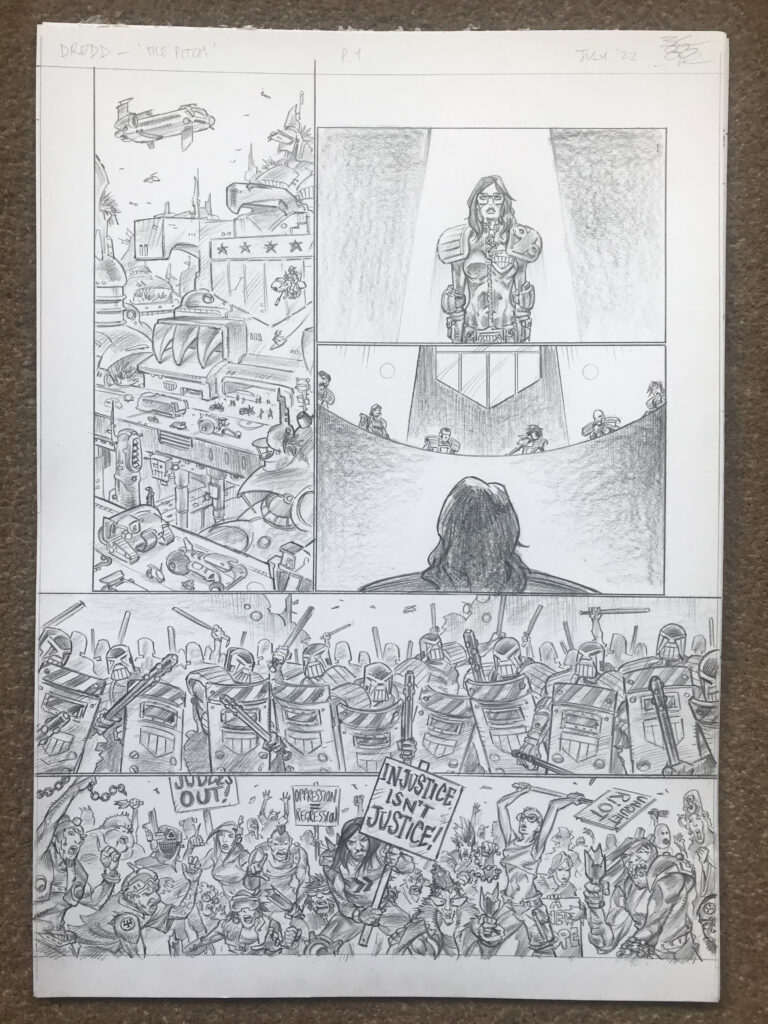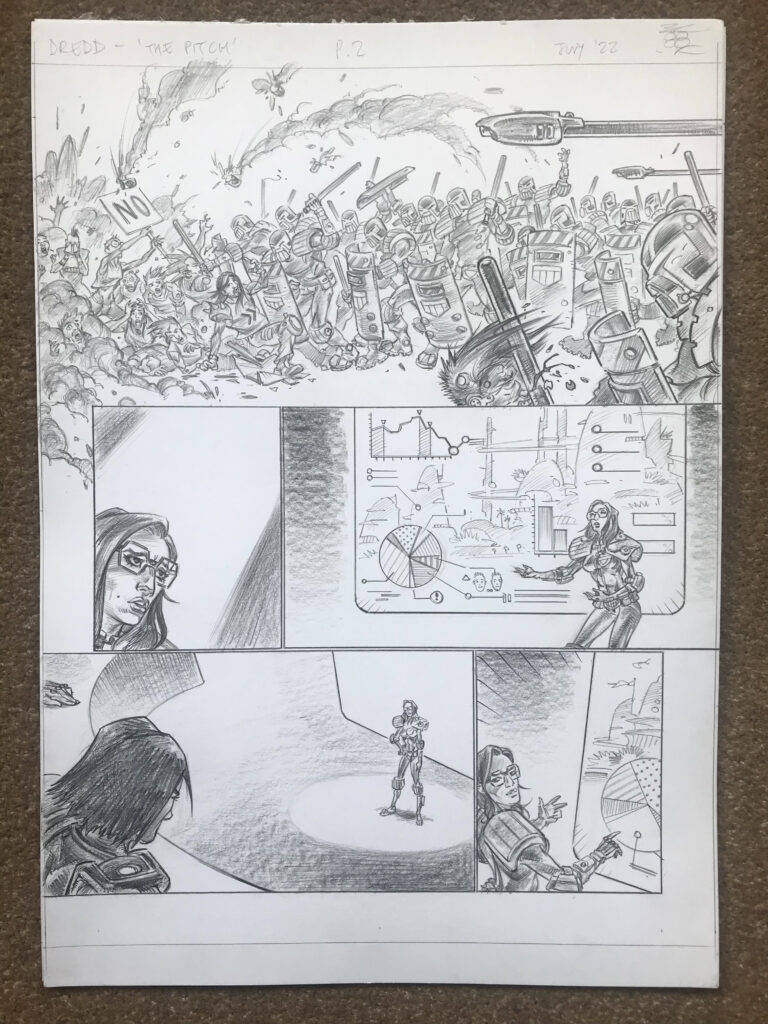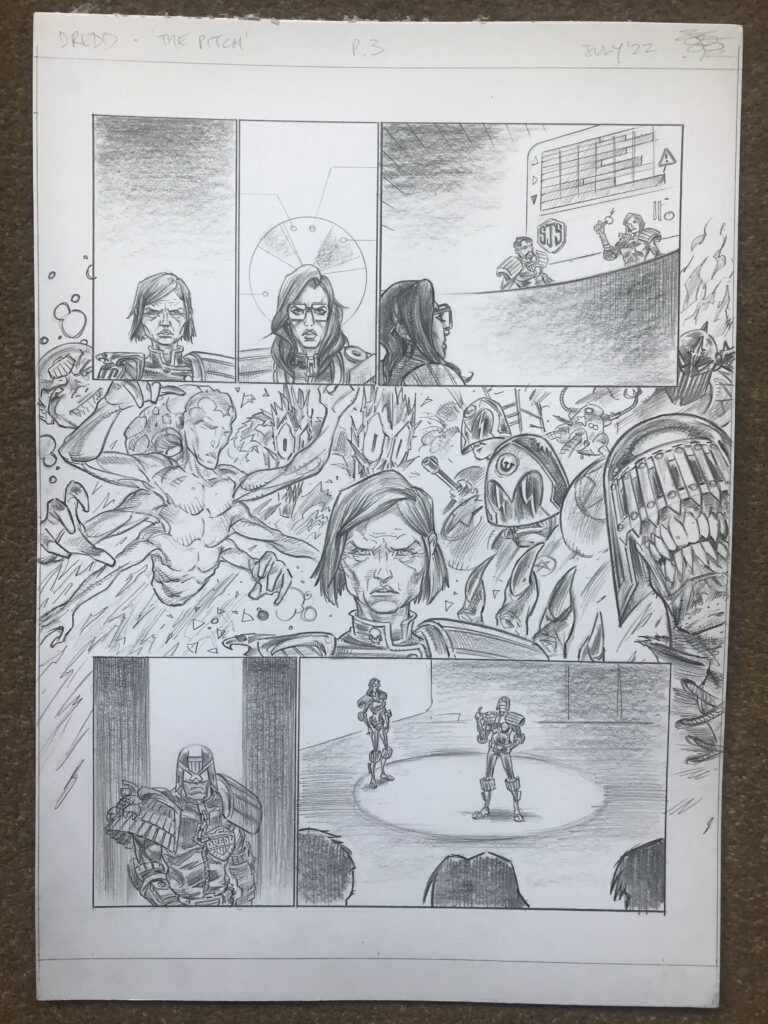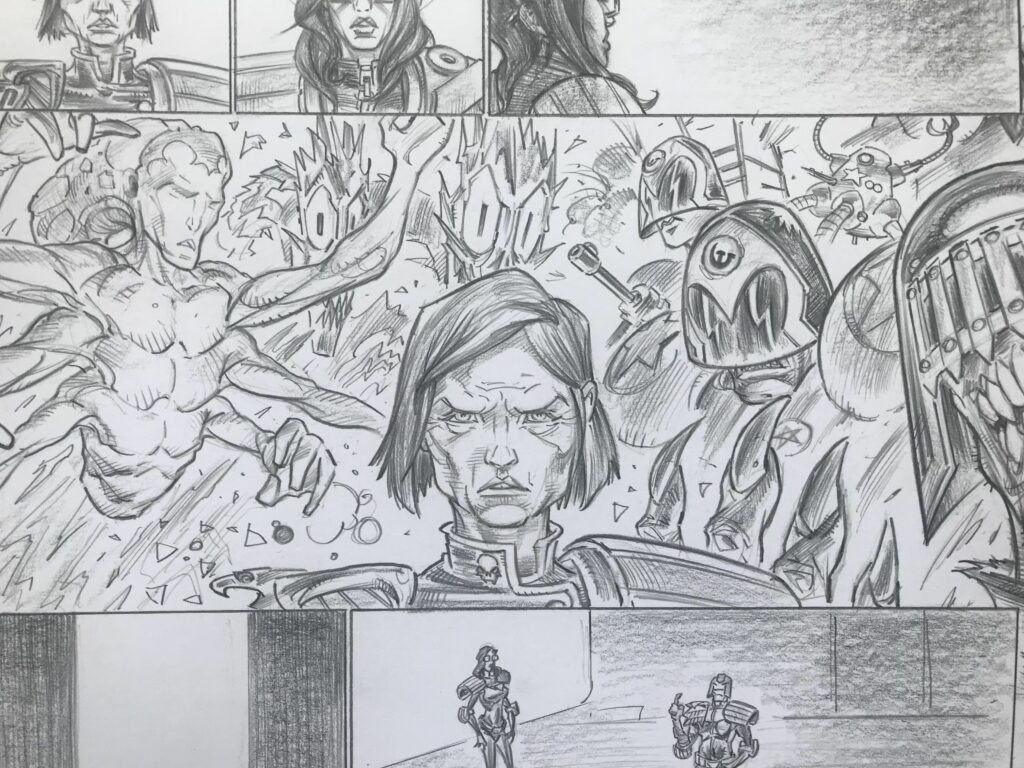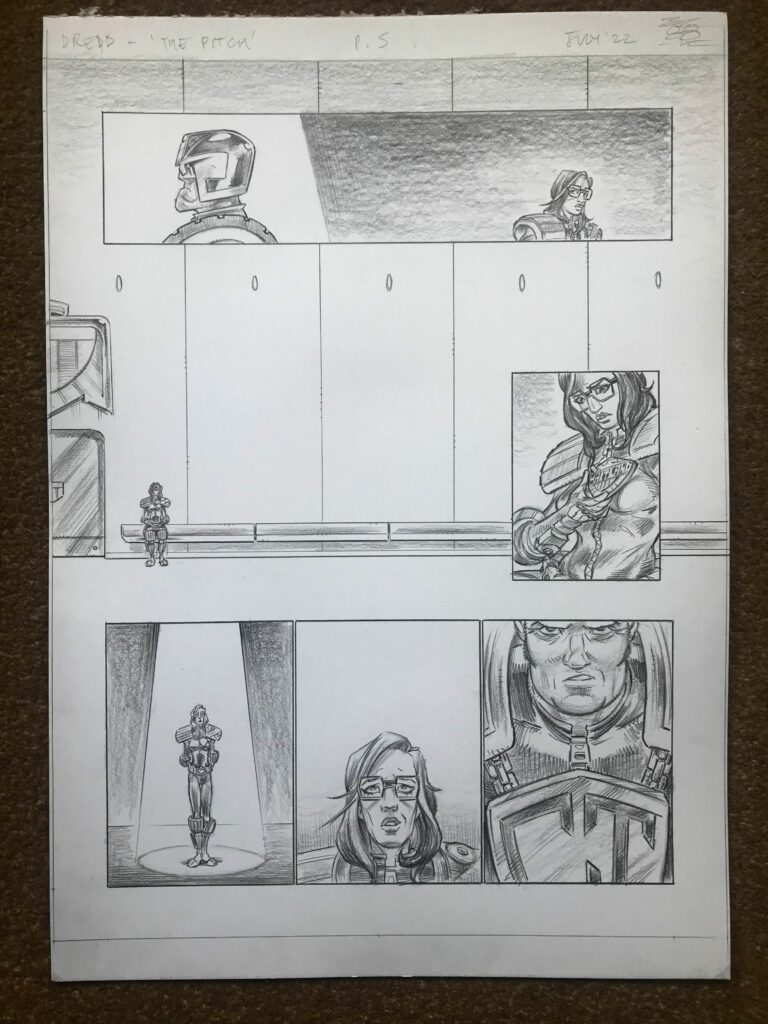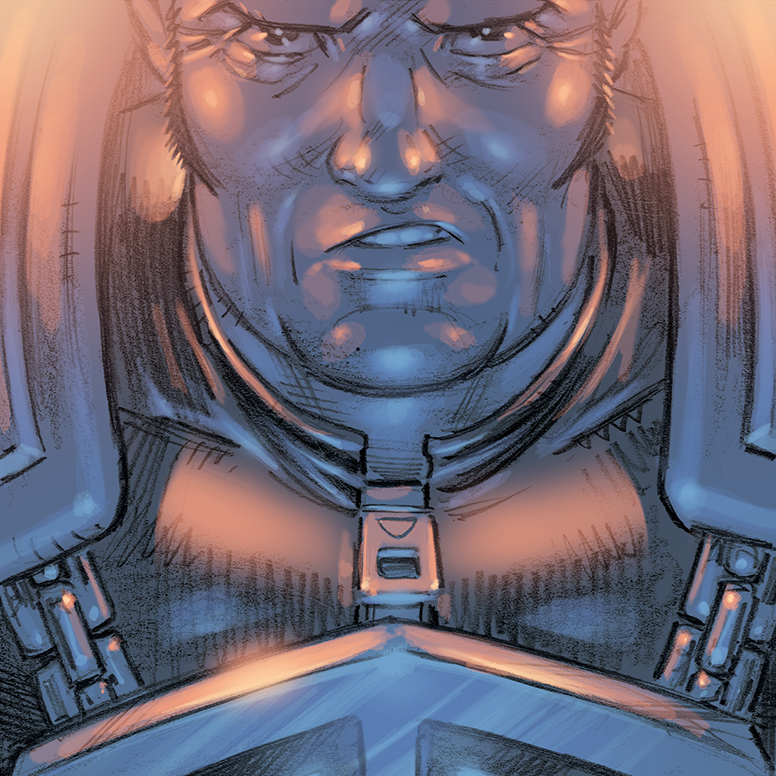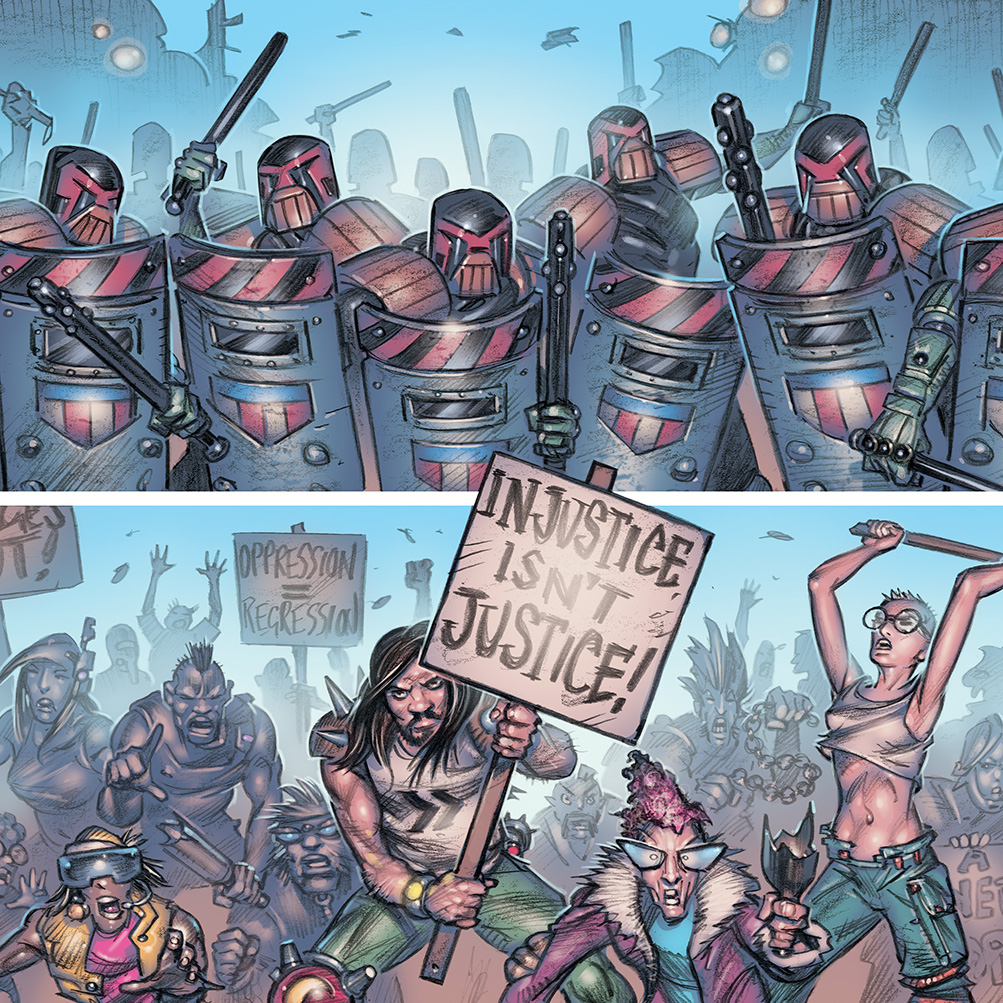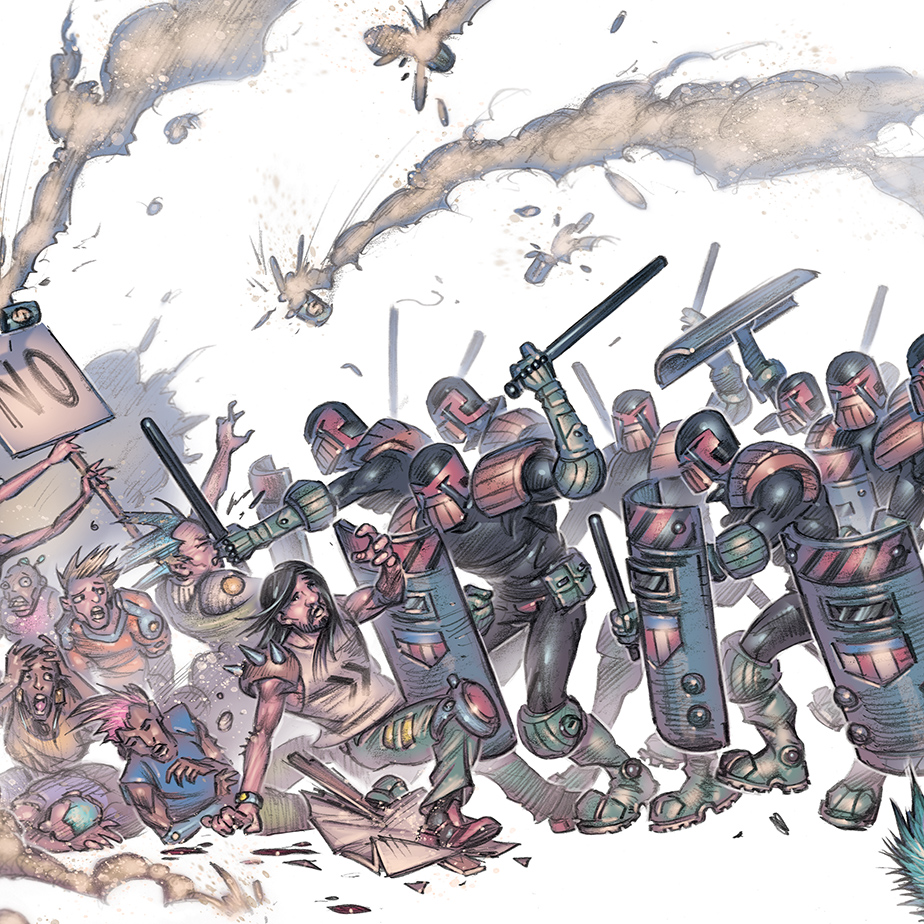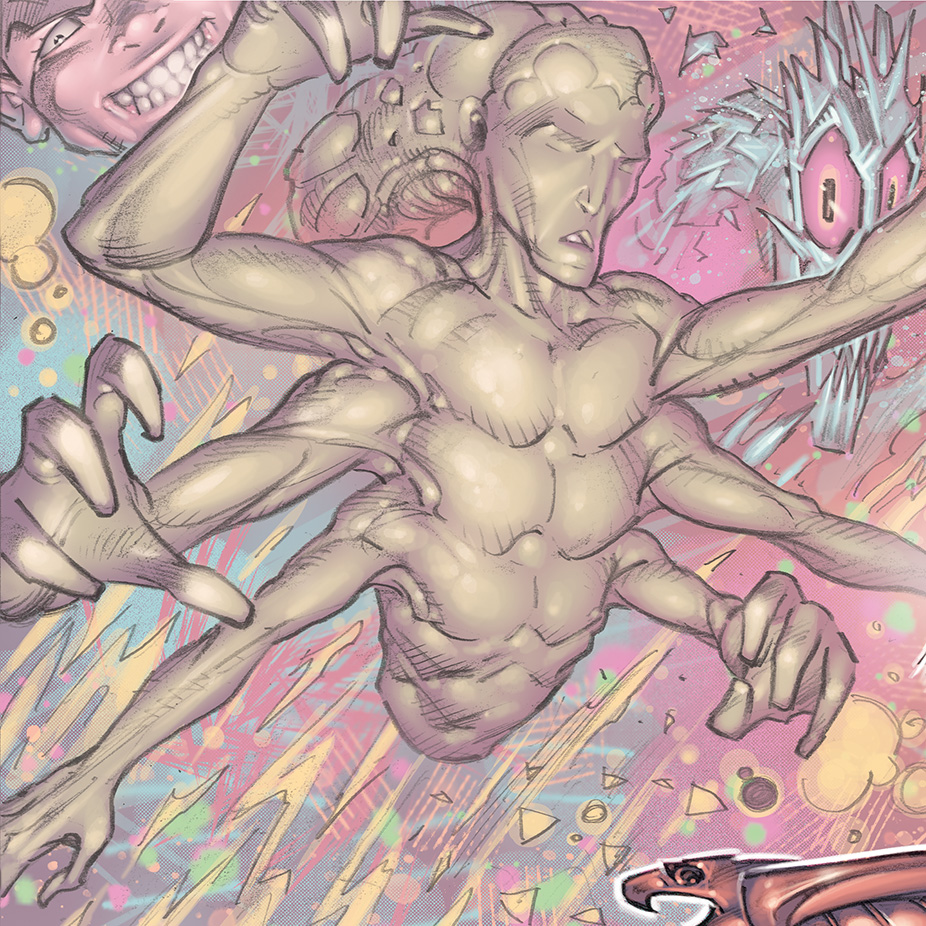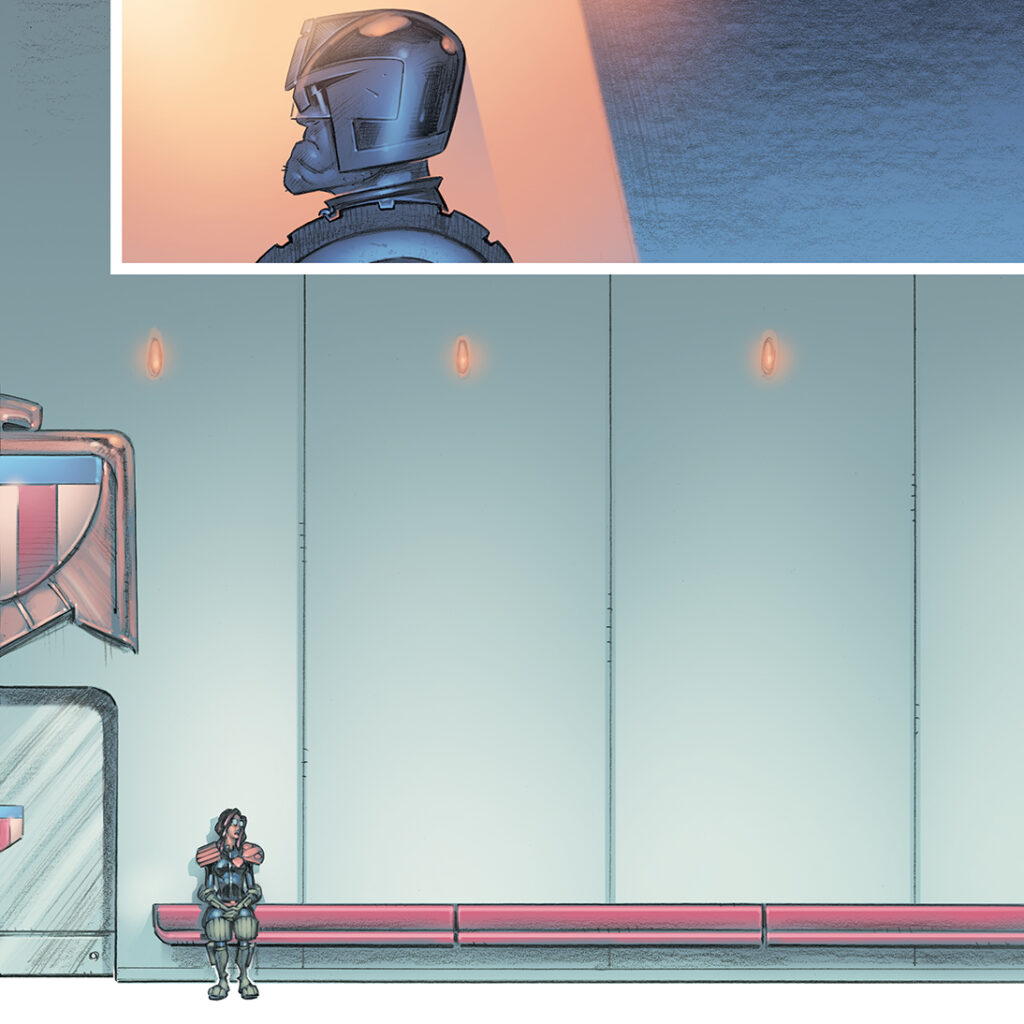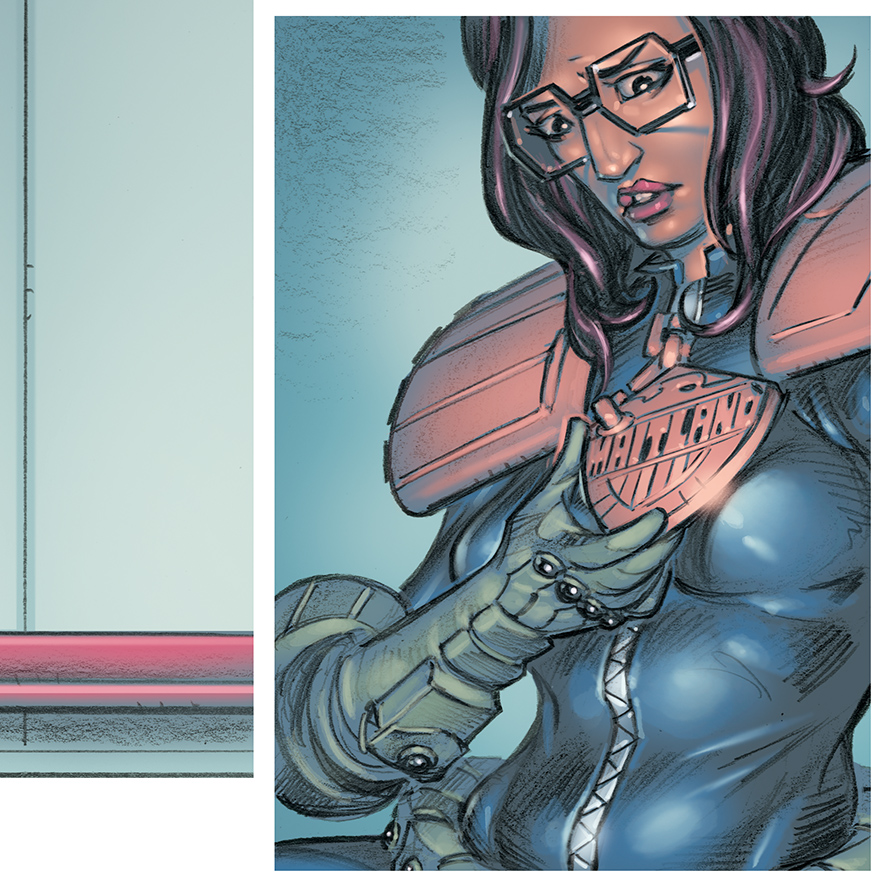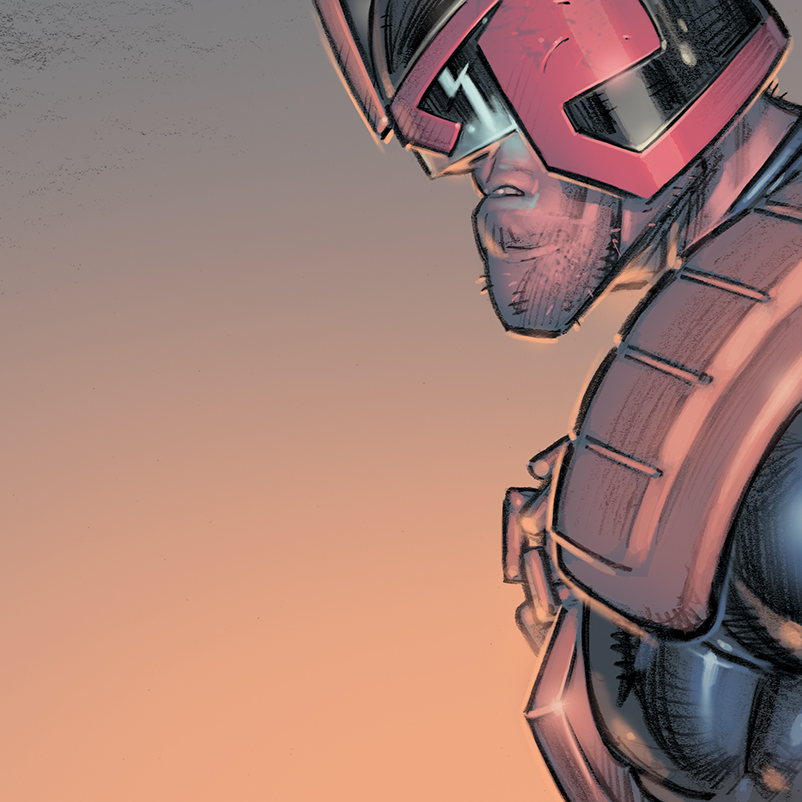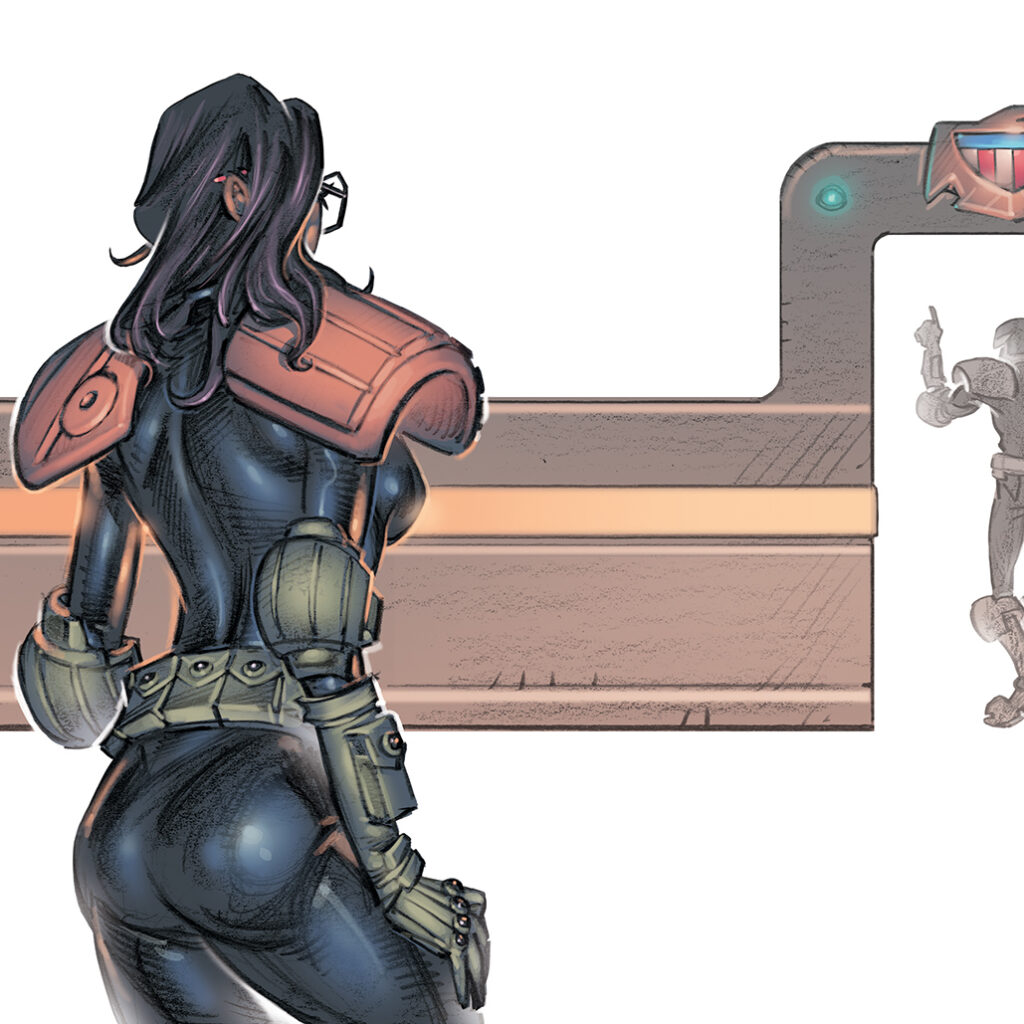Interview: Revisiting ‘The Pitch’ with Arthur Wyatt, Rob Williams, & Boo Cook – ‘Maybe it’s time we tried something different’
12th October 2022
Judge Dredd: The Pitch, in 2000 AD Prog 2302, is just six pages long but it’s potentially hugely important to the world of Judge Dredd. It’s the moment when Accounts Judge Maitland finally gets the word on her monumental plan that could transform Justice Department…
We talk to Arthur Wyatt, Rob Williams, and Boo Cook all about just how big these changes could be.
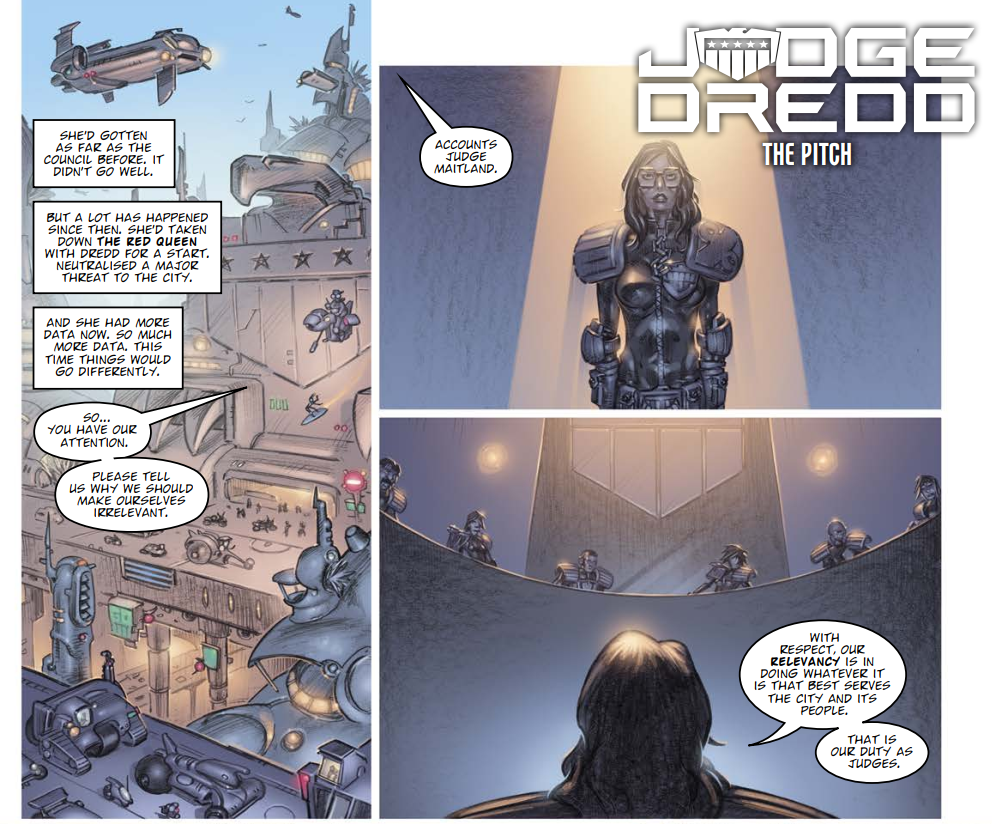
When writer Al Ewing and artist Nick Dyer’s accounts Judge Maitland first appeared back in The Bean Counter in 2012’s Prog 1790, no one had no idea just how wrapped up in Dredd’s world she’d become.
She’s appeared in Trifecta, Titan, Enceladus, Control, The Small House, and more recently in the Red Queen saga and The Hard Way. But one of her most important moments may well prove to be in Carry The Nine (Progs 2200-2203) where Maitland’s emergency budget projections turned into a model that speculated how a huge increase in welfare and education spending could practically wipe out crime in Mega-City One.
Now, in The Pitch (Prog 2302) Maitland comes before the Council once more.
Written by Arthur Wyatt and Rob Williams, with Boo Cook repeating his artistic turn from Carry The Nine, to say it’s an important moment in the history of Dredd is an understatement – or is it?
Well, there’s only a few people who can clear that up – so it’s time to chat to Arthur, Rob, and Boo and find out just what The Pitch means for Judge Maitland, Judge Dredd and MC-1…

Hello there Arthur, Rob, and Boo. Let’s talk about the recently published Judge Dredd: The Pitch, a sort of culmination of the story that’s been bubbling under for a few years now, with the focus on Accounts Judge Maitland.
Although Maitland’s creation was down to Al Ewing and Nick Dyer, I don’t think anyone can argue that you’re the ones most responsible for her recent history and her increasing importance in Dreddworld. She’s certainly come a long way from being ‘just’ an Accounts Judge!
So… how would you all describe what you’ve done with The Pitch and how things have developed for Maitland since Carry The Nine?
ROB WILLIAMS: I’ve written Maitland a lot over the years. I think I liked the idea of an Accounts Judge as it’s so opposite to Dredd. So much of what Dredd does is based on might and action and physical strength. But a Judge like Maitland helps keep the City running, keeps the structures intact.
So… what if she saw different structures? What if she saw a better way of running the system that might not mean open warfare on the streets of Mega-City One day after day after day. Would the Judges allow that to happen?
She’s one of the few Dredd really trusts. That’s why I put her in his small guerilla team in The Small House. She’s earned his respect. He’s going to listen to her.
Bottom line is, she’s smart, and she’s a good Judge. She might just be able to push this through. The ‘Defund The Police’ parallels are obvious – what if instead of spending so much money on arming the Judges for warfare, they spent more on educating the citizens?

ARTHUR WYATT: I’d wanted to do a joint story with Maitland since we were using her in different storylines and it seemed like it would be fun to bring them together a little, and at the same time Rob was working on End of Days and wanted to follow that up with a story that didn’t immediately reset to the status quo, and having Maitland dealing with the damage to the city and wanting to find a new way of doing things.
This is Mega-City one. Good things don’t happen, at the same time Maitland is a force of nature, so that ended in a bit of a stalemate…
Cue The Hard Way, which tied in more to the Red Queen plotline, and where frustration at that stalemate has caused Maitland to channel her skills into some things she CAN do: using forensic accounting to utterly wreck the shit of a major international criminal she’s been tormenting, inadvertently triggering an assassination attempt, and blowing up a minor Dreddworld city. Blowing up Atlantis was something Rob pushed for and it’s been great for opening up plotlines – the conclusion to the Red Queen story happening in its wake, the follow-up stories Rob did with Brit City and Sentientoid – fragments of that explosion going everywhere.
Some of that we had in mind from the start but a lot of it was very organic.
The Pitch is a story in the wake of those stories, when things have died down a little, and Maitland, having taken down The Red Queen, is able to make her case again with a lot more leverage.
And of course, because we’re revisiting the meeting of Carry the Nine it’s the perfect story for Boo, who did a great job bringing the first set of council scenes to life.
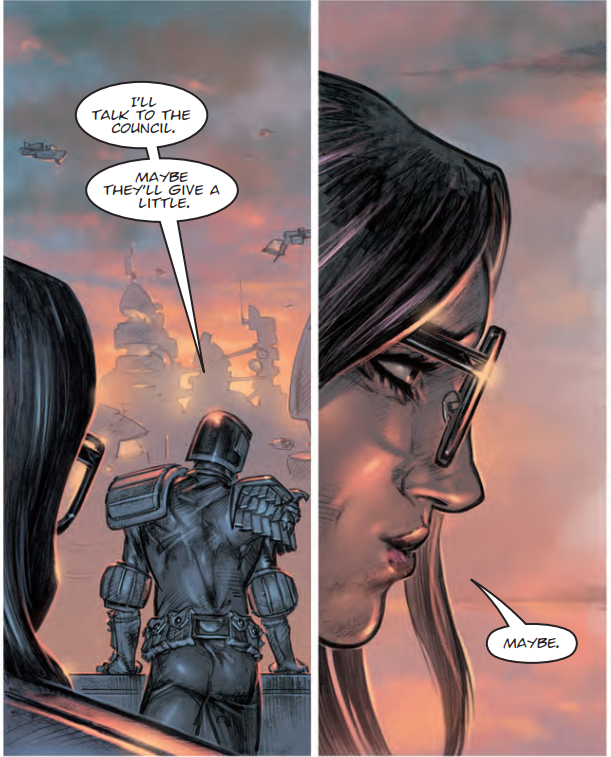
BOO COOK: Obviously Rob and Arthur are gonna be the main speakers on this as they make all the gnarly decisions and plot twists, I’m more of a happy hitchhiker who has lucked into being part of something great… but hopefully I’ve helped to flesh it out with the required emotional clout.
Boo, you’ve definitely done that!
In terms of writing it, seeing as it’s just six pages, how on earth does the collaboration work here? I mean, you’re not going to be writing alternative pages or anything like that are you?
AW: The easiest way to collaborate seems to be to divvy up episodes, each do a first pass then hand it over to the other for an edit pass…. But you’ll note that only works for even numbers… and not for a single issue story. There we generally have been breaking things up into the front and back halves and doing a variation on the same process, but they tend to merge together a lot more during the edits.
There’s also a certain amount of killing your darlings involved… we always had the idea that we’d have a parallel action-heavy storyline with Dredd, which in the end became a very condensed three-panel opening sequence I liked a lot, and then in the end that ended up in the woodchipper as it’s just not the focus of the story, and we’d set ourselves the task of making this meeting interesting so that’s where the action had to be – even if that action is slideshows.
(I am totally stealing that three-panel sequence back at some point)
RW: I think – my memory’s terrible – the whole reason Arthur and I started collaborating is that he wanted to use Maitland in his Red Queen stories and would I mind, as she was one of my recurring Dredd cast. That was kind of him to ask. We started talking and this sort of long-running occasional Maitland story followed from there. And one of the cool things about writing Dredd occasionally is you write one story and it sort of suggests offshoots. Characters appear and deserve their own stories. Plot threads pop up that are interesting to follow.
We approach a 6-pager the same way we would a longer story. Knock ideas back and fore on email, one writes up a plot breakdown, the other makes edits/changes and we go back and fore until we’re both happy. And then when it comes to script we simply split in half for first draft. In this case Art, I think, took Pages 1-3 and I took 4-6? (memory…) But we each get an edit on each other’s pages so hopefully the rough edges get filed off and it reads like one voice.
Also, Boo Cook did such a great job on Carry The Nine – the Maitland story that set up The Pitch’s core idea. It seemed very right to get him back for The Pitch.
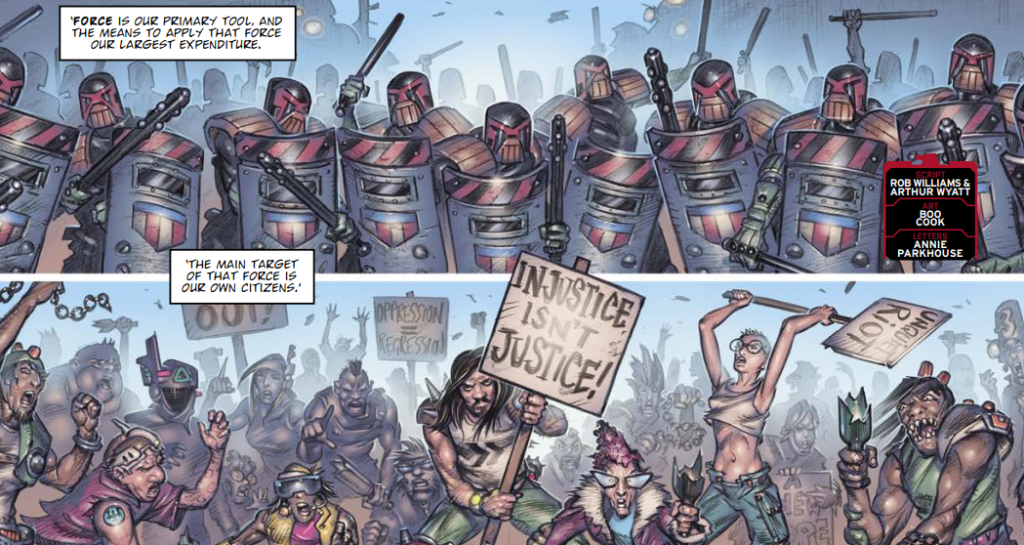
Obviously, it’s not the end to the whole Judge Maitland saga, as the end of The Pitch opens things up for the future – although not as revolutionary as perhaps we might have thought (and Maitland hoped).
But was this where you always envisaged things going for Maitland and her grande plan?
RW: The Council were never going to just say “yes, we will change the entire structure of our city” to her. It’s a pretty dull dramatic story if the predictable happens and they just say ‘no’ at the end.
We wanted to give her some sort of win, and to then tease out the bigger story to come. And Dredd sticking up for her felt like one of those rare glacial moments of emotional growth you see in Dredd once a decade. That was, hopefully, unexpected. Take a Sector, trial your idea. See if it works.
AW: Previously we had the stalemate of Carry the Nine, and some stories that pushed other plots forwards but kept Maitland’s big idea in a bit of a holding pattern. Now… Grudd help us… we’ve set up a situation where something has to happen, something has to change, and we’ve set ourselves a time limit.
I’m not sure it’s a grande plan as much as us repeatedly throwing ourselves off balance then finding interesting ways to deal with that. We’ve a rough outline of where things end up, and we already have another story that sets some pieces up for it, but bouncing off each other and keeping things a little organic is always a big part of what we are doing here.
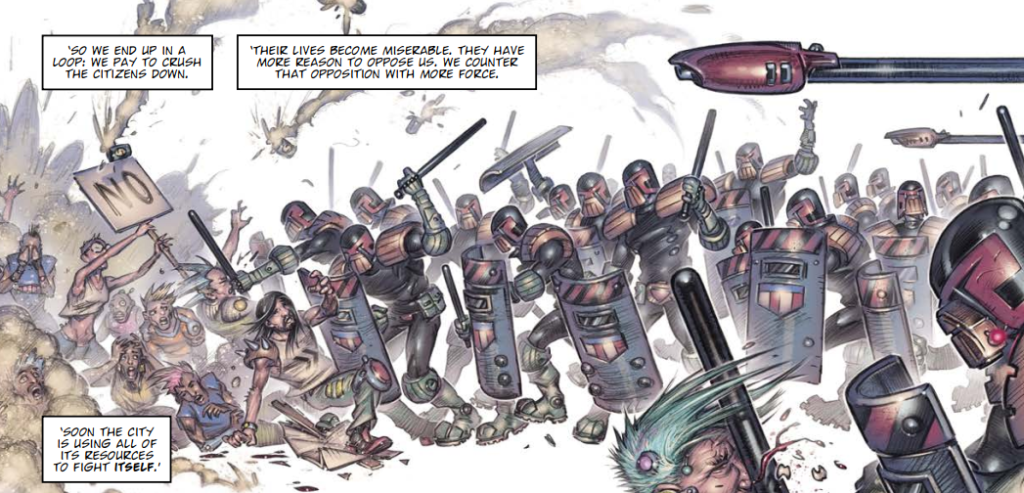
BC: In terms of the general direction of this story arc, for a while now I’ve been searching for something deeper in the comics I read and help create – quite often the focus is on a protagonist or band of such folk having a problem with something or someone and over the course of the story building up to a large fight with it… the end.
As some may have learned in recent years you can’t punch an idea – if you don’t agree with something or wish to see some change for the better in the world you have to engage with it on fair logical terms and that is what we see Maitland doing in Carry The Nine and The Pitch.
It’s refreshing to finally be a part of (various) comics projects where there’s potential for a positive outcome – great examples of how things could be if we weren’t such idiots, as opposed to simply ‘ending’ the thing you disagree with in a two-dimensional black and white tale. Obviously, Rob, Art, and time will tell if that’s actually how this particular arc will pan out but it’s great to be involved at least potentially in some creative optimism.
Having said that, this is Mega-City One so I won’t place any bets just yet…

One thing that has marked out Maitland’s saga is the time it’s taken. This is no big epic that runs all in one go but a slow burn of a thing. And to my mind, that’s merely heightened to the payoff here.
Was it something that you all had in mind way, way back, breaking Maitland’s involvement into guest appearances and slowly building it all up?
AW: I think it’s largely been shaped by the working process and that we are threading it with other storylines, but that practical concern also works out well for the nature of the story. What Maitland is trying to do… it is not fast-paced.
I think we are going to have to finish things off with at least one longer-length story though, hopefully with an even number of episodes.
RW: It’s sort of the nature of the beast with Dredd. There is no one writer. Ken Niemand has his stories, I have my individual ones, Art has his. John Wagner will sometimes come up with something like The Citadel. There’s always breaks between your stories, and that allows the world to feel sort of lived in and real. You can drop the idea of the next story and it not show up for months. Dredd has other things to deal with.
Now, talking about the way things have gone with Maitland and what the Council have come up with, what about Dredd’s involvement with it all?
Over the years, there’s been many different sides of Dredd that we’ve seen in the Prog and the Megazine, whether that’s the fascist authoritarian cop or the one who sees the Law needing to change as evidence comes in. And the one we see in the last few panels here is the epitome of this, the one willing to try new things to see the Law work.
RW: He’s no great thinker, Dredd, but he’s not dumb. He knows better than anyone what a war it is out on those streets. And he’s getting older. It takes a toll. Like he says to Maitland “Maybe it’s time we tried something different.” That’s about as speech-y as Dredd gets. But “maybe” is a big thing for him.
AW: One of the things about Maitland that Al established from the very start is she’s like Dredd… if Dredd’s thing was numbers and not street level violence. She’s got the same dedication to the city, the same conviction that she has to do the right thing. She’s really not fighting the system deliberately here so much as she’s convinced the system can and needs to be better and seeing that she has no choice but to change things.
Not all the system may agree with her.
Finally, I assume we’ll be picking up with Maitland’s storyline and the experiment that the Council have approved here in the times to come?
Want to give us a few teases of what we can expect?
RW: Yeah, Art and I have talked through the ending of this whole Maitland saga. It’s quite a big story, if we can pull it off and tie in all the loose ends. Hopefully we can get Boo back for that one too to give the whole thing some symmetrical booked feel. First though there’s a three-Parter on the way from us that follows on one of those plot threads I mentioned from The Hard Way/Atlantis story we did last year – The Hagger They Fall. And Sentientoid, who also came from The Hard Way story, is a character I like a lot. we’ll be seeing him too.
AW: Drawing a tarot card… is it coins? Or is the nine of swords?
BC: If schedules will allow I’d love to be on board for the resolution of Judge Maitland’s current arc – she’s such a strong character and a perfect example of someone who can (mostly) fight battles with logic rather than Lawrods.
Maybe her plan will work and Mega City One will become a wonderful utopia? I suspect there’s a few folk in the mix who won’t allow that to happen but if Arthur and Rob know already, they ain’t telling! Whether I’m working on it or just reading it I can’t wait to see how it pans out…
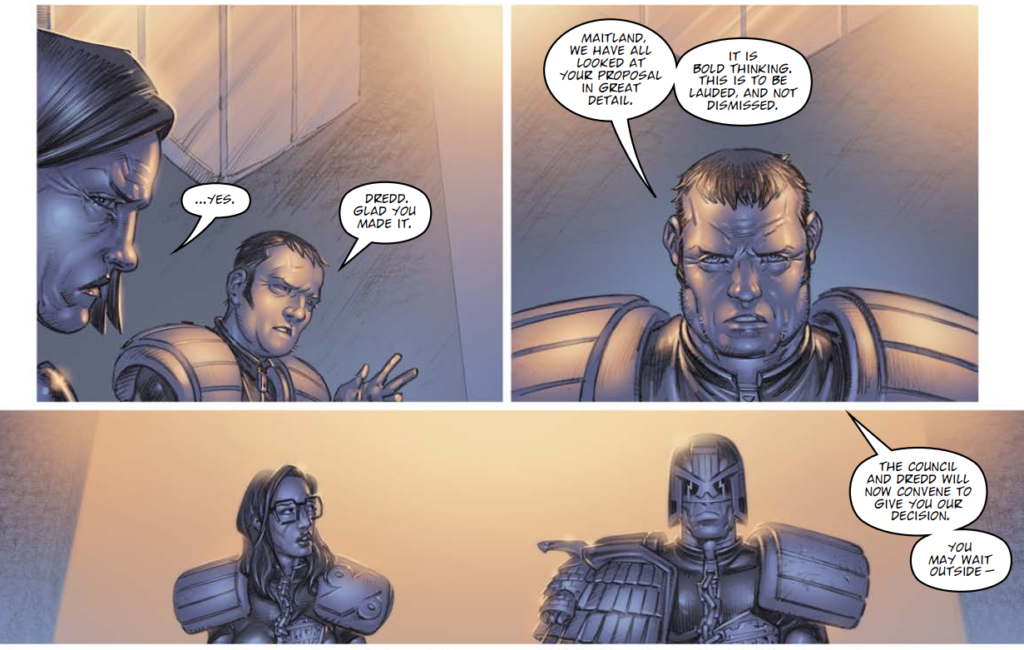
Boo, I know this one’s been very writing-heavy, but you’re an intrinsic part of Maitland’s journey, having provided artwork for both Carry The Nine and The Pitch.
Certainly here in The Pitch, and to a lesser extent in Carry The Nine, so much of the drama comes from what’s being said rather than being done. Indeed, in The Pitch, we’re almost being told the tale of a presentation and the reactions to it. So, as an artist, how do you go about this as a job, how did you break it down to inject the sense of expectation and drama required (and delivered) to make this so important?
BC: I absolutely love working on Dredd so when a new script arrives I get very excited about the massive exploding mutants and skysurfers etc. that I’ll be drawing so it’s a bit of a curve ball when a script arrives about people essentially discussing a powerpoint presentation!
It goes without saying for anyone who’s read Carry The Nine and The Pitch that there is so much more going on than that, but as someone whose usual stomping ground is intense psychedelic space action it’s a bit of a challenge. Luckily, I like a challenge.
In The Pitch, there are a lot of talking heads, so one of the first things I try and do is work out ways of making it less about talking heads or if it has to be, how to get the acting and framing as full of emotional intent as possible.

BC: Hopefully Art and Rob will forgive me but I tweaked things a bit for some more visual oomph on page 3 – in the script SJS Judge Waldron is talking about some of the big super villains of the Dredd verse and the script simply required headshots of her talking to Maitland, but because this is comics it’s possible to slot in a muted background of all that crazy stuff that she’s referencing without it physically being there. Then I added a bonus panel of Dredd arriving with the words ‘Judge Death?’ which Annie Parkhouse picked up on perfectly with the lettering.
Aside from that kind of embellishment to spice things up a bit it’s mostly about absorbing the speech and really trying to get the characters to ‘say’ it with conviction – this meant a lot of underplaying and subtlety where I would usually fill a page with exploding mind jazz.
Exploding mind jazz – Boo, that should definitely be on your bio somewhere to describe what you do!
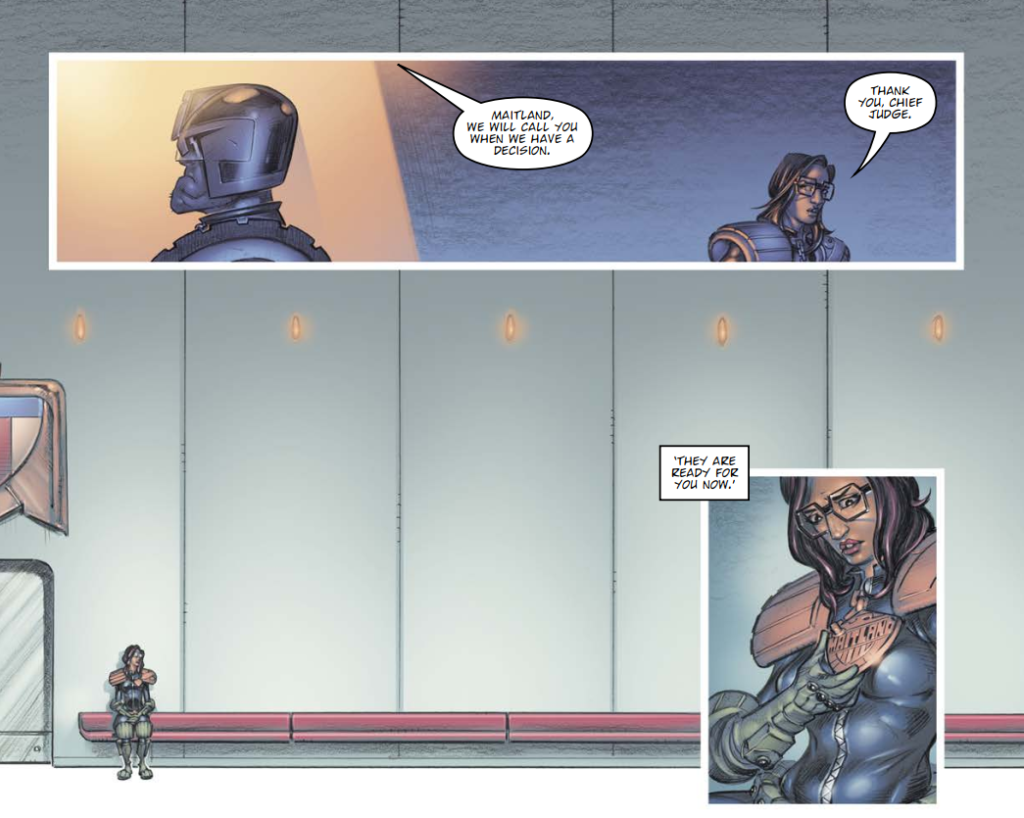
BC: There were some really choice moments in the script to help me along with this, particularly on page 5 where Maitland is sat outside waiting for the VERDICT. I don’t think I’ve ever put so little on a page before but R+A clearly intended this to be a poignant page and i thank them for giving me space to try and do it justice.
Finally on the last page, we all know Dredd smiling is a rare thing but when he delivers the line ‘Maybe it’s time we tried something different’ I wanted him to at least be not heavily frowning as usual and popped in a shard of sunlight just breaching his shoulder to usher in that potential optimism…
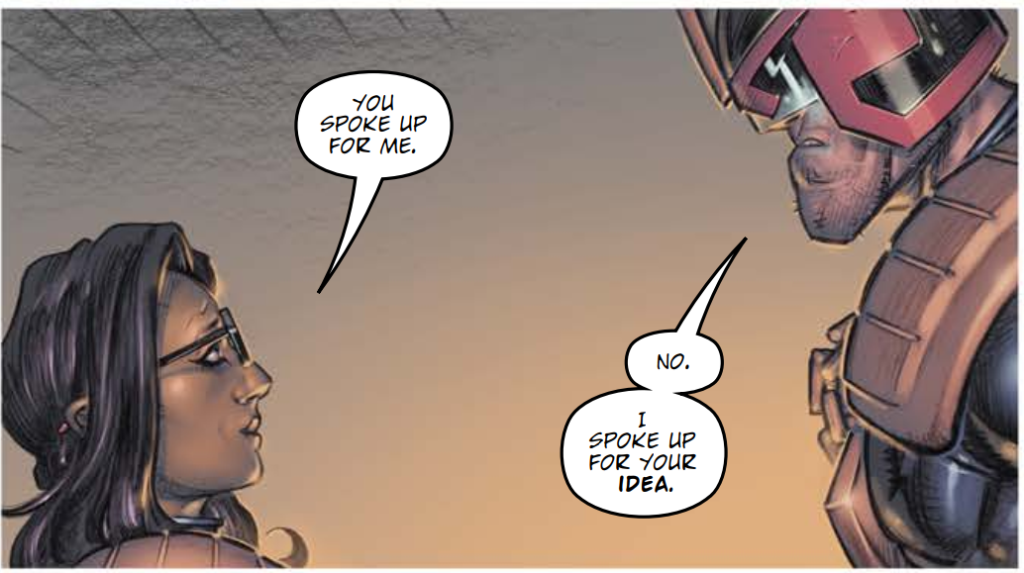
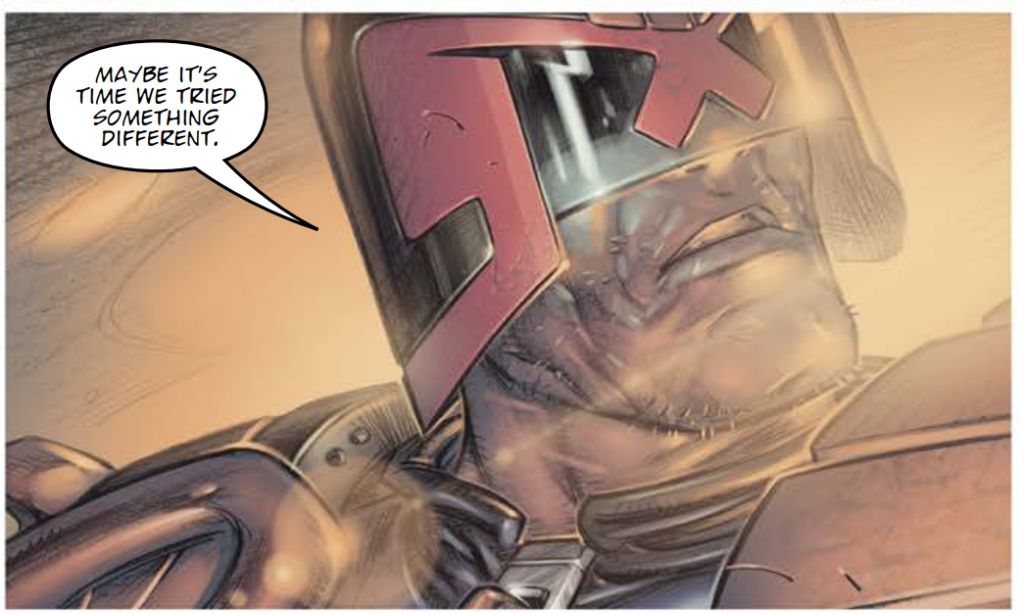
We’ve obviously talked before about your artwork and how it’s evolving, but with these Dredds and the recent (and brilliant) Death Cap in the Judge Dredd Megazine, what changes have you wrought in both idea and process?
BC: With my last major chunk of comics work; Blunt, I’d gone back to the old skool pencils/inks/digi colour process, in part because I’d spent a few years being blown away by Nick Dyer’s original inked pages and wanted to try that approach once more as it basically just looked like a lot of fun.
What I learned over the years of producing Blunt was that artistically that way of working, although pretty satisfying, isn’t quite who I am art wise. Inking takes a lot of confidence and boldness and I realised that I’m more of a ‘slowly chip away and sculpt the image’ kind of artist.
Working purely with graphite initially (no inks) helps me to get a bit closer to the image in my head – it’s more subtle and gives me a chance to get more realistic mood and texture into the work before painting over it digitally in Photoshop. It takes a lot longer than the inky approach but I feel happier with it and folk seem to prefer it so since Blunt that’s style I’ve gone for.

There you go – our huge thanks to Arthur, Rob, and Boo for taking the time to talk to us. You can find Judge Dredd: The Pitch in 2000 AD Prog 2302 – available right here from the 2000 AD web shop. It may be one of the most important Dredd stories in many, many years – we’ll just have to wait and see how Maitland’s plans play out and just how monumental the changes are!
Now, as an added bonus and because he’s just such a damn fine bloke, Boo sent along a load of extras including some of his favourite bits and his pencil work for The Pitch…
